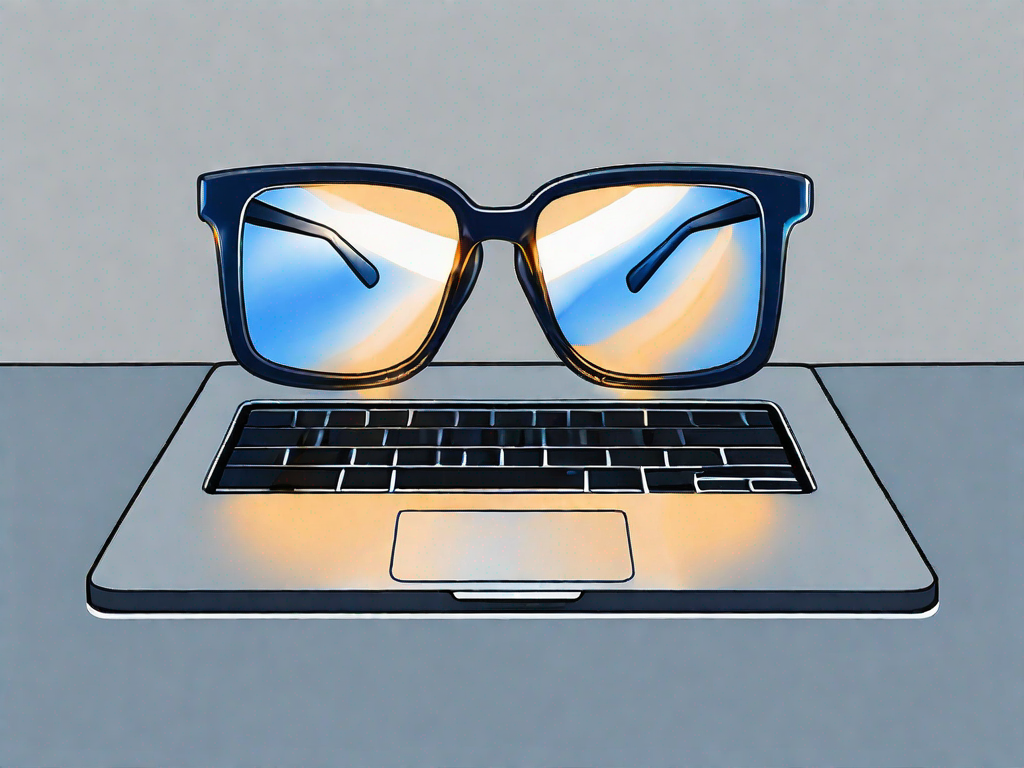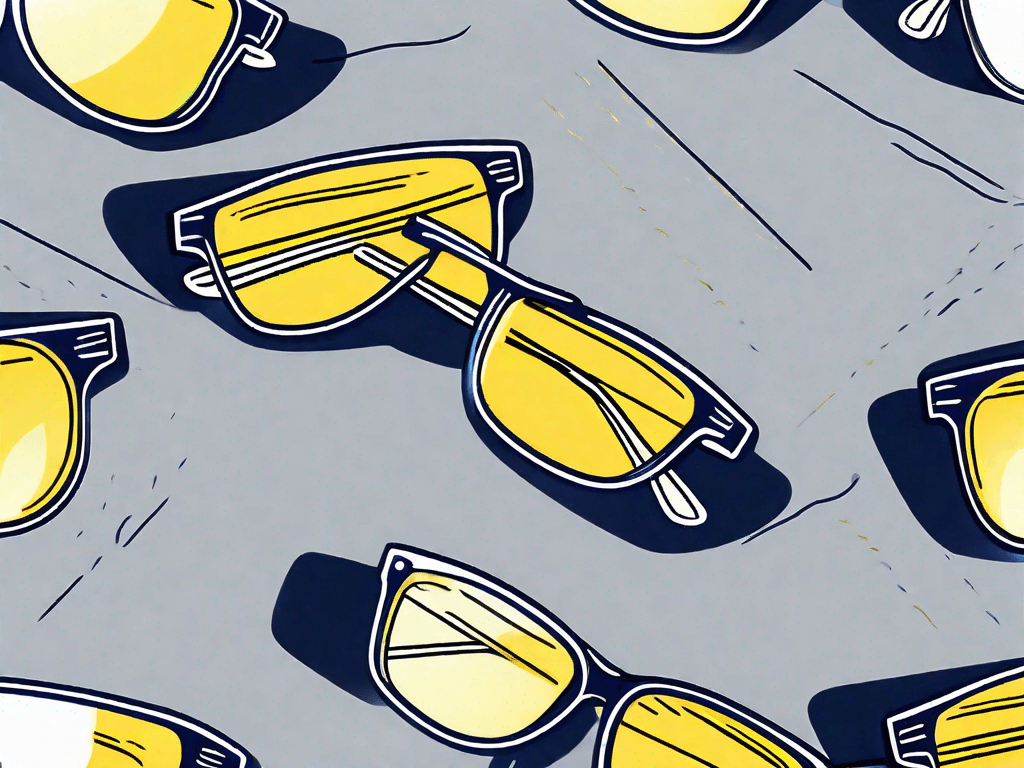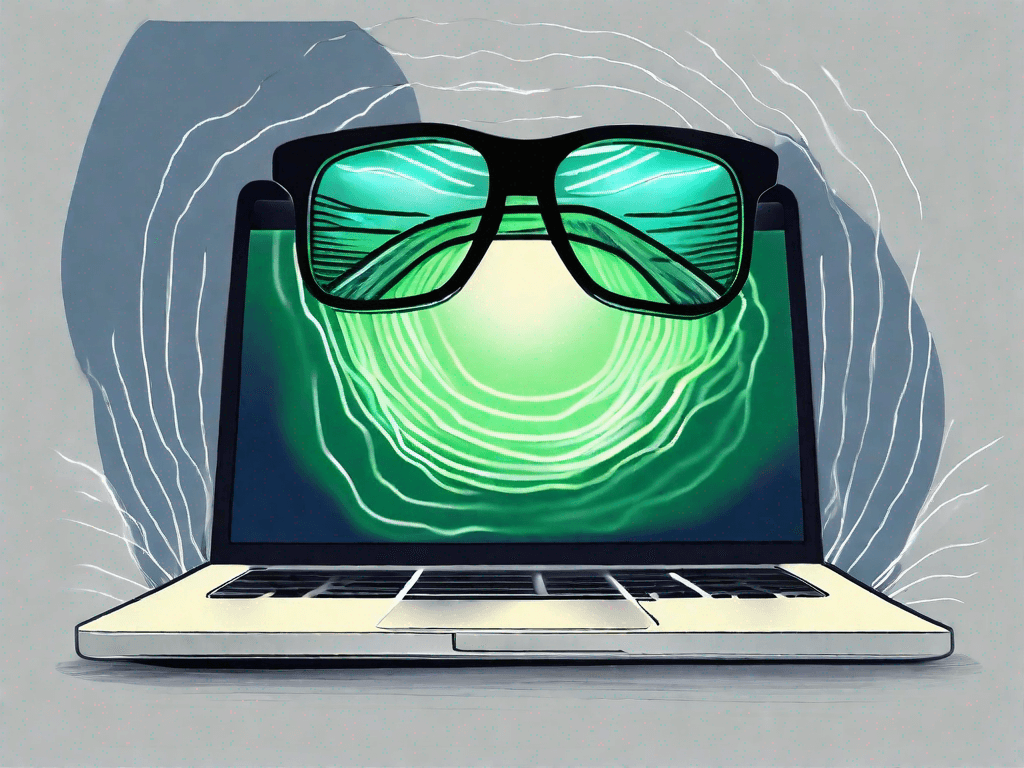Exploring the Pros and Cons of Blue Light Glasses
In today's digital age, we are more exposed than ever to blue light emitted by electronic devices such as smartphones, tablets, and computers. This has led to an increased interest in blue light glasses as a potential solution to the eye strain and sleep disruption caused by prolonged exposure to blue light. However, as with any new trend, it is important to understand both the advantages and disadvantages before making an informed decision.
In this article, we will delve into the science behind blue light, the rise of blue light glasses, the advantages they offer, the potential drawbacks, and factors to consider before buying.
Understanding Blue Light: What is it?
Before we explore the pros and cons of blue light glasses, it is essential to have a basic understanding of what blue light is. Blue light is a high-energy visible light with a short wavelength that is part of the visible light spectrum. It is present naturally in sunlight, but it is also emitted by electronic devices and energy-efficient light bulbs. Our increased exposure to blue light due to the modern digital lifestyle has raised concerns about its potential effects on our eyes and overall well-being.
Blue light has become a hot topic in recent years, with many studies and discussions focusing on its impact on our health. Researchers have found that blue light plays a crucial role in regulating our circadian rhythm, also known as our internal body clock. Exposure to blue light during the day helps us stay awake and alert, while limited exposure in the evening promotes better sleep.
The Science Behind Blue Light
Blue light is known to have a shorter wavelength and higher energy than other types of visible light. This means it scatters more easily and can cause glare, leading to eye strain. Additionally, blue light has the potential to penetrate the retina more deeply than other colors of light.
When blue light enters our eyes, it stimulates special cells in the retina called ganglion cells. These cells play a crucial role in regulating our sleep-wake cycle, as they send signals to the brain to suppress the production of melatonin, a hormone that helps us sleep. This is why exposure to blue light in the evening can interfere with our sleep patterns and make it harder for us to fall asleep.
Sources of Blue Light
Blue light is emitted by a variety of sources, including the sun, electronic devices, and artificial lighting. While sunlight is the primary source of blue light, the increased use of digital devices has significantly increased our exposure. Smartphones, tablets, computers, and even energy-efficient light bulbs emit blue light, contributing to our daily dose of blue light exposure.
It's important to note that not all blue light is harmful. In fact, some blue light exposure during the day is beneficial for our overall well-being. Sunlight, for example, contains a balanced spectrum of colors, including blue light, which helps regulate our sleep-wake cycle and boosts our mood. However, excessive and prolonged exposure to blue light, especially in the evening, can have negative effects on our health.
With the rise of digital devices and the increasing amount of time we spend in front of screens, it's no wonder that concerns about blue light have grown. Many people experience symptoms such as eye strain, dry eyes, headaches, and difficulty sleeping, which they attribute to excessive blue light exposure. This has led to the development of blue light glasses, which claim to filter out or reduce the amount of blue light that reaches our eyes.
While the effectiveness of blue light glasses is still a topic of debate among experts, many individuals find relief from their symptoms when using them. Blue light glasses typically have special lenses that block or absorb blue light, reducing the strain on our eyes and potentially improving our sleep quality.
As our understanding of blue light continues to evolve, it is crucial to strike a balance between the benefits and risks associated with its exposure. Being aware of our blue light habits, taking breaks from screens, and considering the use of blue light glasses are some steps we can take to protect our eyes and well-being in the digital age.
The Rise of Blue Light Glasses
As awareness of the potential negative effects of blue light has grown, so too has the popularity of blue light glasses. These glasses are specifically designed to filter out or block blue light, thus reducing the amount of blue light that reaches our eyes. Let's take a closer look at what blue light glasses are and how they work.
Blue light glasses have become a staple accessory for many individuals, especially those who spend a significant amount of time in front of digital screens. With the rise of technology and the increasing use of smartphones, tablets, and computers, our exposure to blue light has dramatically increased. This has led to concerns about the potential long-term effects on our eye health.
What sets blue light glasses apart from regular eyewear is their ability to combat the harmful effects of blue light. These glasses feature lenses with a special blue light filter coating, which helps to block or absorb blue light before it reaches our eyes. By doing so, they provide a shield against the potential negative impact of blue light.
What are Blue Light Glasses?
Blue light glasses, also known as computer glasses or blue blockers, are eyewear that features lenses with a blue light filter coating. This coating helps to block or absorb blue light, preventing it from reaching the eyes. Blue light glasses are available in both prescription and non-prescription forms, making them accessible to a wide range of individuals.
These glasses come in various styles and designs, allowing individuals to find a pair that suits their personal taste and fashion preferences. Whether you're looking for a sleek and modern look or a more retro-inspired frame, there is a wide range of options available to choose from.
Moreover, blue light glasses are not limited to a specific age group or profession. They have gained popularity among students, office workers, gamers, and anyone who spends a significant amount of time in front of screens. The versatility and functionality of blue light glasses have made them a must-have accessory in today's digital age.
How Do Blue Light Glasses Work?
Blue light glasses work by blocking or filtering out a portion of blue light before it reaches the eyes. The lenses are specially designed to selectively absorb blue light while allowing other colors of light to pass through. The result is a reduction in the amount of blue light that reaches the retina, potentially alleviating the strain on the eyes caused by prolonged exposure.
When we expose our eyes to blue light emitted by digital screens, it can disrupt our sleep patterns, cause eye fatigue, and even contribute to the development of digital eye strain. Blue light glasses act as a barrier, shielding our eyes from the potentially harmful effects of blue light.
These glasses are not only beneficial for reducing eye strain but also for improving sleep quality. By reducing our exposure to blue light in the evening, blue light glasses can help regulate our circadian rhythm and promote a more restful night's sleep.
It's important to note that blue light glasses are not a magical solution to all eye-related issues. While they can provide relief from the symptoms associated with prolonged screen time, it's still essential to practice good eye care habits, such as taking regular breaks, adjusting screen brightness, and maintaining proper posture.
In conclusion, the rise of blue light glasses is a testament to our growing awareness of the potential harm caused by blue light exposure. These glasses offer a practical and stylish solution to combat the negative effects of blue light, making them an essential accessory for anyone who spends a significant amount of time in front of screens. So, if you're looking to protect your eyes and enhance your visual comfort, consider investing in a pair of blue light glasses.
The Advantages of Blue Light Glasses
Now that we have a better understanding of blue light and blue light glasses, let's explore the advantages they offer.
Blue light glasses have gained popularity in recent years due to their potential benefits for eye health and sleep quality. In this expanded version, we will delve deeper into the advantages of wearing blue light glasses.
Eye Strain Relief
One of the primary benefits of blue light glasses is the potential to reduce eye strain caused by prolonged exposure to blue light. People who spend significant amounts of time in front of screens may experience symptoms such as dry eyes, blurred vision, and headaches. These symptoms, collectively known as computer vision syndrome, can significantly impact daily productivity and overall well-being.
Blue light glasses can help alleviate these symptoms by filtering out the harmful blue light and reducing glare. The lenses of these glasses are specially designed to block a portion of blue light emitted by electronic devices, such as smartphones, tablets, and computer screens. By reducing the amount of blue light reaching the eyes, these glasses provide relief from eye strain and improve visual comfort.
Improved Sleep Patterns
Exposure to blue light in the evening can disrupt our natural sleep patterns by suppressing the production of melatonin, a hormone responsible for regulating sleep-wake cycles. The blue light emitted by electronic devices, such as smartphones, televisions, and laptops, is particularly problematic in this regard.
By wearing blue light glasses in the evening, especially when using electronic devices, we can protect our melatonin production and promote better sleep quality. The lenses of these glasses filter out the blue light, preventing its negative impact on our sleep-wake cycles. This can lead to improved sleep patterns, better restfulness, and increased daytime alertness.
Potential Protection Against Eye Damage
Although the evidence is still limited, some studies suggest that blue light may contribute to the development of certain eye conditions, such as age-related macular degeneration (AMD). AMD is a leading cause of vision loss among older adults, and its prevention is of utmost importance.
Blue light glasses that filter out or block blue light may offer potential protection against these eye conditions. By reducing the amount of blue light reaching the retina, these glasses may help minimize the risk of AMD and other related eye diseases. However, further research is needed to fully understand the long-term effects of blue light exposure and the extent of protection offered by blue light glasses.
Blue light glasses provide several advantages for those who spend significant time in front of screens or are concerned about the potential effects of blue light exposure. They offer relief from eye strain, promote better sleep patterns, and may potentially protect against certain eye conditions. Incorporating blue light glasses into our daily routine can be a proactive step towards maintaining healthy eyes and overall well-being.
The Disadvantages of Blue Light Glasses
While blue light glasses offer several advantages, it is important to consider the potential drawbacks before making a decision.
Blue light glasses have gained popularity in recent years due to their potential benefits in reducing eye strain and improving sleep. However, there is an ongoing debate among experts regarding their effectiveness. Some studies have shown a positive impact on reducing eye strain and improving sleep, while others have found minimal benefits. It is important to note that individual experiences may vary, and more research is needed to determine the true effectiveness of blue light glasses.
Aside from the effectiveness debate, it is also worth considering potential side effects. While blue light glasses are generally considered safe to use, some individuals may experience mild side effects. These can include changes in color perception, mild dizziness, or discomfort caused by the tinted lenses. It is important to be aware of these potential side effects and to consult with an eye care professional if you experience any unusual symptoms or discomfort.
Another factor to consider is the cost of blue light glasses. They are available in a range of prices, depending on factors such as brand, style, and prescription requirements. While some options may be affordable, others can be quite expensive. It is essential to weigh the potential benefits against the cost to determine if blue light glasses are a worthwhile investment for your specific needs.
While blue light glasses offer potential benefits in reducing eye strain and improving sleep, it is important to consider the ongoing debate regarding their effectiveness, potential side effects, and the cost involved. It is always recommended to consult with an eye care professional before making a decision on whether to invest in blue light glasses.
Making an Informed Decision
Before purchasing blue light glasses, it is important to consider several factors.
When it comes to protecting our eyes, making informed decisions is crucial. With the increasing amount of time we spend in front of screens, it's no wonder that blue light glasses have gained popularity. But before jumping on the bandwagon, let's delve deeper into the world of blue light glasses and explore the factors that should be considered.
Factors to Consider Before Buying
First and foremost, it is recommended to consult with an eye care professional. They can assess your specific eye health needs and provide personalized recommendations. Our eyes are unique, and what works for one person may not work for another. By seeking professional advice, you can ensure that you are making the best decision for your eye health.
Consider your lifestyle and daily habits. Do you spend prolonged periods in front of screens? Are you experiencing eye strain or difficulties sleeping due to blue light exposure? If so, blue light glasses may be beneficial. These glasses are designed to filter out the harmful blue light emitted by electronic devices, reducing eye strain and potentially improving sleep patterns.
However, it's important to note that blue light glasses may not be necessary for everyone. If you have no significant eye strain symptoms or difficulties sleeping, other approaches, such as adjusting screen settings or taking regular breaks from electronic devices, may be sufficient. It's all about finding the right balance for your individual needs.
Alternatives to Blue Light Glasses
If you are uncertain about investing in blue light glasses, there are alternative measures you can take to reduce blue light exposure. Many electronic devices have built-in features that allow you to adjust the screen's color temperature, reducing the amount of blue light emitted. By tweaking these settings, you can create a more comfortable viewing experience for your eyes.
Practicing good screen hygiene is another effective way to minimize eye strain. Taking regular breaks from screens, maintaining a comfortable viewing distance, and practicing the 20-20-20 rule (looking at something 20 feet away for 20 seconds every 20 minutes) can all help alleviate the strain on your eyes.
Furthermore, incorporating healthy habits into your lifestyle can have a positive impact on your eye health. Eating a balanced diet rich in nutrients that support eye health, such as omega-3 fatty acids and antioxidants, can contribute to maintaining good vision. Additionally, protecting your eyes from harmful UV rays by wearing sunglasses when outdoors can help prevent long-term damage.
The Role of Regular Eye Check-ups
Regardless of whether you choose to invest in blue light glasses or not, it is essential to prioritize regular eye check-ups. Our eyes are complex organs, and regular check-ups with an eye care professional are crucial for maintaining their overall health and well-being.
During these check-ups, an eye care professional can assess your vision, screen for any underlying eye conditions, and provide personalized recommendations based on your unique needs. They can also address any concerns you may have and offer guidance on how to maintain optimal eye health.
Remember, prevention is key when it comes to eye health. By scheduling routine visits with an eye care professional, you can catch any potential issues early on and take proactive measures to protect your eyes.
In conclusion, blue light glasses have gained popularity as a potential solution to the eye strain and sleep disruption caused by prolonged exposure to blue light. They offer advantages such as eye strain relief, improved sleep patterns, and potential protection against eye damage. However, there are also potential drawbacks to consider, including effectiveness and cost. By considering factors such as individual needs, lifestyle, and consulting with an eye care professional, individuals can make an informed decision about whether blue light glasses are a suitable investment for their eye health.





